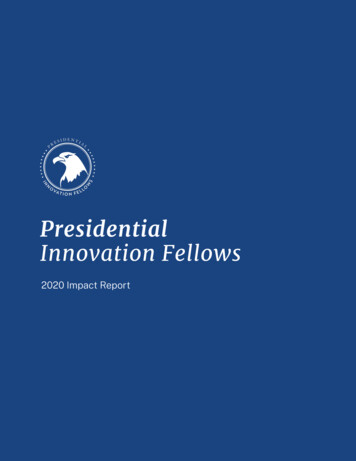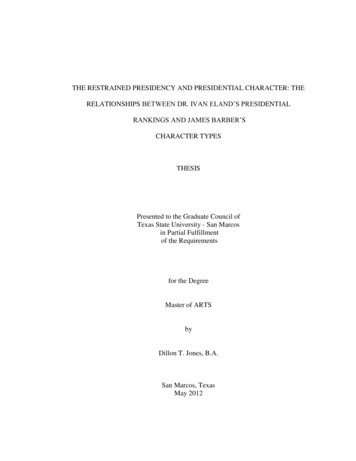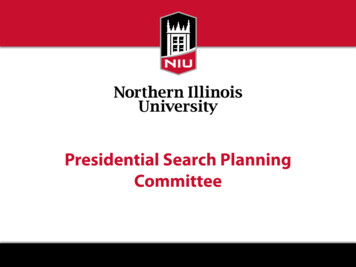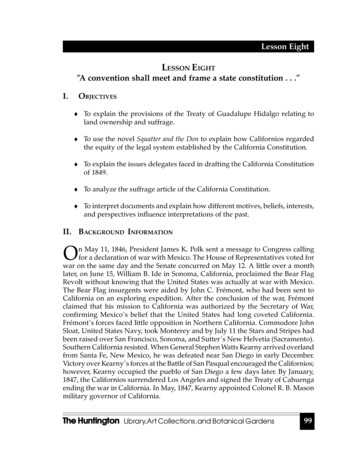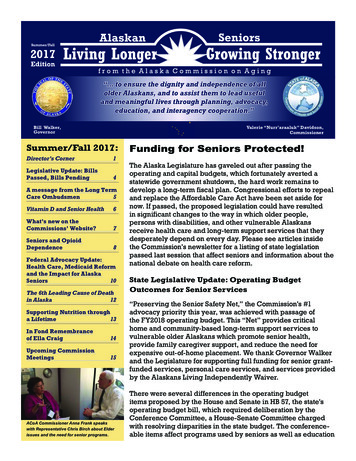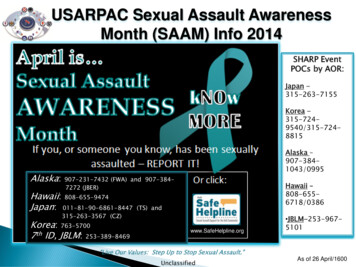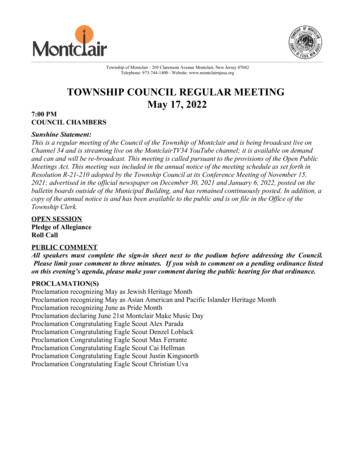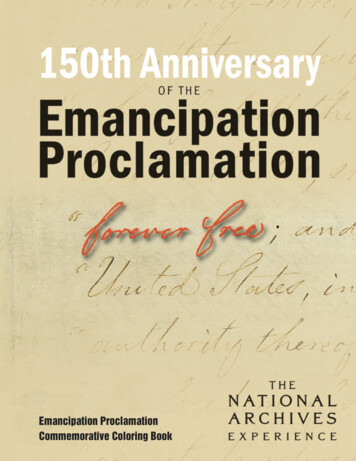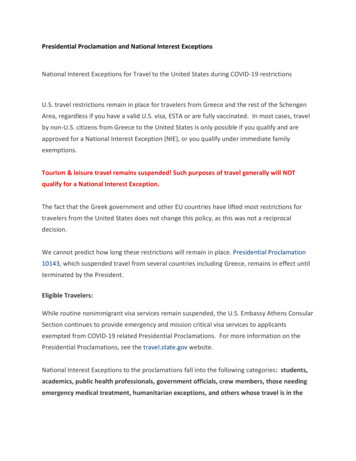
Transcription
Presidential Proclamation and National Interest ExceptionsNational Interest Exceptions for Travel to the United States during COVID-19 restrictionsU.S. travel restrictions remain in place for travelers from Greece and the rest of the SchengenArea, regardless if you have a valid U.S. visa, ESTA or are fully vaccinated. In most cases, travelby non-U.S. citizens from Greece to the United States is only possible if you qualify and areapproved for a National Interest Exception (NIE), or you qualify under immediate familyexemptions.Tourism & leisure travel remains suspended! Such purposes of travel generally will NOTqualify for a National Interest Exception.The fact that the Greek government and other EU countries have lifted most restrictions fortravelers from the United States does not change this policy, as this was not a reciprocaldecision.We cannot predict how long these restrictions will remain in place. Presidential Proclamation10143, which suspended travel from several countries including Greece, remains in effect untilterminated by the President.Eligible Travelers:While routine nonimmigrant visa services remain suspended, the U.S. Embassy Athens ConsularSection continues to provide emergency and mission critical visa services to applicantsexempted from COVID-19 related Presidential Proclamations. For more information on thePresidential Proclamations, see the travel.state.gov website.National Interest Exceptions to the proclamations fall into the following categories: students,academics, public health professionals, government officials, crew members, those needingemergency medical treatment, humanitarian exceptions, and others whose travel is in the
U.S. national interest for vital support to critical infrastructure, significant economic activity,or national security reasons.Most travel purposes that fall under the B1/B2 visa category and ESTA will likely not qualify fora National Interest Exception. This includes, but not limited to: tourism; vacations; visitingfamily or friends; visiting a fiancée or partner; attending a wedding or graduation ceremony;routine business meetings, attending an annual professional conference; maintaining a rentalor investment property; etc.A student with a valid F or M visa and a valid I-20 form may travel to the United States withoutan NIE or further action by the Embassy. Diplomats and Government employees traveling on Aor G visas also do not require NIEs. All other travelers that already have valid visas or ESTAauthorization must receive approval for an NIE prior to travel.Athletes must request an NIE from U.S. Customs and Border Protection (CBP). We are no longerauthorized to consider sports-related NIEs.Some travelers may qualify for family exemptions and do not require an NIE, such as legallymarried spouses of U.S. citizens or Lawful Permanent Resident (Green Card holders).Instructions for requesting a National Interest Exception* NIE applicants must be legal residents and physically present in Greece. All others, pleasecontact your nearest U.S. Embassy or Consulate General.SUBMIT YOUR NIE REQUEST AT LEAST 10 BUSINESS DAYS BEORE TRAVEL!Step 1: Send an email to AthensUSConsul@state.govwith the subject line “NIE mm-dd-yyyy,” replacing the letters with the month, day and year ofyour intended travel date. For example, “NIE 12-25-2021″ if you are traveling on December 25,2021. Your e-mail MUST contain all the following:
A scanned copy of each traveler’s visa or ESTA authorization; A scanned copy of each traveler’s passport biographic data page; Purpose of travel (and any supporting documents); A copy of your flight itinerary, or proposed travel dates.Incomplete NIE requests will be ignored and further delay your application.Step 2: Please allow up to 10 business days for Consular Officers to review your documents andqualifications. U.S. Consular Section Athens is processing hundreds of NIE requests per daywith limited resources. We appreciate your patience during this process. Please do not send usmultiple applications or repeated requests for updates, as this only further slows down ourability to process NIEs in a timely fashion.We will only consider expedited NIE requests in life & death matters.Step 3: Travelers will be notified by email if they receive approval for a National InterestException. Do not attempt to check in to your flight online or travel before you receive emailnotification of your NIE approval. The NIE will be issued electronically and visible to relevantgovernment agencies and airlines.NIE VALIDITY EXTENDED TO ONE YEAR, MULTIPLE ENTRIESEffective July 5, 2021, all NIEs will be valid for 12 months and multiple entries for the samepurpose of travel. This is also retroactive for NIEs issued within the past 12 months.For example: if you were previously issued an NIE on November 1, 2020, you may continue totravel to the United States until October 31, 2021 without any further action or notificationrequired to this Embassy. However, the purpose of travel must be for the same reason asoriginally requested. If you require travel for a different purpose, a new NIE will be required.
Travelers without Valid VisasIf you believe that you fall into any of the above categories, need to travel immediately, andrequire a visa, please follow the guidance provided s/Mandatory COVID Testing and Quarantine Requirements for TravelAll airline passengers to the United States ages two years and older must provide a negativeCOVID-19 viral test taken within three calendar days of travel – even if you have already beenfully vaccinated. Alternatively, travelers may provide documentation from a licensed healthcare provider of having recovered from COVID-19 in the 90 days preceding travel. Check theCDC website for additional information and Frequently Asked Questions. The CDC Control andPrevention testing requirement also includes testing and self-quarantine guidelines you mustfollow after your arrival in the United States.FAMILY-BASED EXEMPTIONSCertain travelers are exempt from COVID travel restrictions including: Legally married spouses of U.S. Citizens (USC); Legally married spouses of Lawful Permanent Residents (LPRs, commonly known as“Green Card” holders); Under-21, unmarried child of a USC or LPR; Parent or guardian of an under-21, unmarried USC or LPR; Under-21 unmarried sibling of an under-21 unmarried USC or LPR.(Unmarried partners, couples with civil partnership (“Σύμφωνο Συμβίωσης”) fiancées, adultchildren, grandparents and other extended family do not qualify for a family exemption.)These travelers do not require NIEs or any notification to this Embassy. If you meet the abovequalifications, you may proceed directly to the airport and bring supporting documentation that
proves your relationship to the U.S. Citizen or LPR relative, such as marriage certificates and/orbirth certificates.DISCLAIMER: Admission to the United States remains subject to a determination by Customsand Border Protection (CBP) officers upon arrival at a U.S. Port of Entry. A valid visa, ESTA or NIEis not a guarantee of admission
U.S. Visa and Travel FAQsHome Home / Visas / U.S. Visa and Travel FAQsImportant: Although some international travel is allowed by the Greek government, U.S.government travel restrictions remain in place for travel from Greece to the United States.Please see below for more details.Thank you for your patience as we work to resume visa services as soon as resources and U.S.and Greek regulations and conditions allow. We will resume routine visa services as soon aspossible but are unable to provide a specific date at this time. If the service you need is notavailable, or if your travel plans are further in the future, keep checking this page as this iswhere we will share any updates. We can’t provide personalized answers by email, socialmedia, or telephone about topics that are covered here.Updated: July 13, 2021Please carefully review this page for important information about U.S. travel restrictions andU.S. visa services in Greece.U.S. travel restrictions remain in place. It is vital that you familiarize yourself with the currentU.S. travel restrictions by reading any presidential proclamation in effect. We cannot assist youwith interpreting the regulations beyond the guidance provided on this website.If any Presidential Proclamation applies to you and you don’t qualify for an exceptionspecifically listed in the proclamation, you can only travel to the U.S. if you obtain an individualnational interest exception before you travel. This applies if you already have a valid visa orESTA, or if you need to apply for a visa or ESTA. Keep reading for details.If you need to apply for a U.S. visa, unavoidable backlogs caused by the impact of coronavirus(COVID-19) on our staffing and resources, and based on our undertaking health and safetymeasures in line with Greek and U.S. guidance mean that visa application procedures aresubject to delay. We have not resumed routine visa services and appointment availability isextremely limited. Being exempt from the travel restrictions does not guarantee an expeditedappointment and our appointment service provider will be best placed to provide any furtherdetails about future interview appointment availability.SECTION 1: Presidential Proclamation & U.S. Travel RestrictionsFAQ 1) What does the Presidential Proclamation mean? Can I travel to the United States?What if I have a negative COVID test?
Entry of foreign nationals who were physically present within the following list of countrieswithin 14 days prior to their entry or attempted entry into the United States is suspended,per Presidential Proclamations 9984, 9992, 9993, 9996 and the subsequent proclamationsissued May 24, 2020, and January 25, 2021: The United Kingdom of Great Britain and Northern Ireland, excluding overseasterritories outside of Europe.The Republic of Ireland.The 26 countries that comprise the Schengen Area (Austria, Belgium, Czech Republic,Denmark, Estonia, Finland, France, Germany, Greece, Hungary, Iceland, Italy, Latvia,Liechtenstein, Lithuania, Luxembourg, Malta, Netherlands, Norway, Poland, Portugal,Slovakia, Slovenia, Spain, Sweden, and Switzerland).The Federative Republic of Brazil.The Islamic Republic of Iran.The People’s Republic of China, not including the Special Administrative Regions of HongKong and Macau.The Republic of South Africa.Click here to read the most recent Presidential Proclamation in full for detailed information.The travel restriction does not apply to: U.S. citizens.Legal permanent residents (LPRs).Most immediate family members of U.S. citizens.Other individuals who are identified in the proclamation.For information on current COVID testing requirements for travel to the United States fromGreece please see the CDC website. The Presidential Proclamation continues to apply totravelers from Greece even with a negative COVID test.If the travel restrictions do not apply to you, we recommend that you carry documentationdemonstrating why you are exempt and a printed copy of the proclamation when you travel.See FAQ 1.4 below for more U.S. travel guidance.If the travel restrictions apply to you and you do not qualify for one of the exceptions listed inthe proclamation, or if you are unsure if the travel restrictions apply to you after reading theproclamation and this page in full, see FAQ 1.6 below for information about how to apply fornational interest consideration.The final decision on admission to the United States is made by U.S. Customs and BorderProtection (CBP) officials at the U.S. Port of Entry. No assurances can be given in advance.
FAQ 2) I'm not sure if the Presidential Proclamation applies to me. Can you help?It is vital that you read the proclamation in full to find out if it applies to you. You can findfurther details on proclamations in effect and exceptions here (travel.state.gov). We are unableto interpret the proclamation for you by email, telephone, or social media beyond theinformation on this website. The below information is provided for guidance only.I will be studying in the United States. Am I exempt from the proclamation?If you hold a valid F-1 or M-1 student visa and you wish to travel to the United States toundertake or resume your studies or Optional Practical Training (OPT), you do not require anational interest exception in order to travel to the United States. This applies even if you wereissued with a national interest exception in the past. This also applies to F-2 and M-2 visaholders traveling with or to join an F-1 or M-1 student. Please check FAQ 1.4 below forimportant information about traveling to the United States. Please note, we are unable toprovide an official letter confirming that you are excepted from a travel restriction.If you need to apply for a F or M student visa urgently, please see FAQ 2.3 for informationabout how to request an expedited appointment.I have a valid fiancé(e) or immigrant visa. Am I exempt from the proclamation?On April 8, 2021, the Secretary of State determined that travel on an immigrant or fiancé(e) visais in the national interest for purposes of granting exceptions under the geographic COVIDproclamations. Individuals with VALID K-1 and immigrant visas are no longer subject to regionalPresidential Proclamations and may travel to the U.S. using their valid visa. All fiancé(e) andimmigrant visa holders are still subject to DHS admissibility determinations and to the Centersfor Disease Control’s requirement for proof of negative COVID19 test no more than 3 daysbefore travel into the U.S.If you are not currently in possession of a valid K or immigrant visa, please see Section 3 forinformation.My spouse is a U.S. citizen or LPR. Am I exempt from the proclamation?This particular Presidential Proclamation does not apply to “any alien who is the spouse of aU.S. citizen or lawful permanent resident.”My child is a U.S. citizen or LPR. Am I exempt from the proclamation as their parent?This particular Presidential Proclamation does not apply to “any alien who is the parent or legalguardian of a U.S. citizen or lawful permanent resident.” Children must be unmarried and underthe age of 21.My parent is a U.S. citizen or LPR. Am I exempt from the proclamation?
This particular Presidential Proclamation does not apply to “any alien who is the child, fosterchild, or ward of a U.S. citizen or lawful permanent resident, or who is a prospective adopteeseeking to enter the United States pursuant to the IR-4 or IH-4 visa classifications.”Please note, the exemption in the Proclamation applies to minor children only.My brother or sister is a U.S. citizen or LPR. Am I exempt from the proclamation?This particular Presidential Proclamation does not apply to “any alien who is the sibling of a U.S.citizen or lawful permanent resident, provided that both are unmarried and under the age of21.”My partner/civil partner is a U.S. citizen or LPR. Are they considered a spouse?The Department of State’s definition of spouse is “Legally married husband or wife. A cohabiting partner does not qualify as a spouse for immigration purposes. A common-lawhusband or wife may or may not qualify as a spouse for immigration purposes, depending onthe laws of the country where the relationship occurs.” This also applies to couples with a civilpartnership contracted in Greece, which is not considered legally equal to marriage forimmigration purposes.I have another relative in the United States. Am I exempt from the proclamation?If your specific relationship isn’t listed in the Presidential Proclamation, then you do not qualifyfor an automatic exception.I have an immigrant visa. Am I an LPR?It is not possible to apply for a Permanent Resident Card (commonly known as a “Green Card”)from outside the United States. When an immigrant visa holder is admitted at a U.S. Port ofEntry, their passport is stamped with the words “Processed for I-551 temporary evidence oflawful residence.” If you have an immigrant visa but you have not been previously admitted tothe United States using that visa then you are considered an immigrant visa holder, not an LPR.I want to transit another country to get to the United States, or transit the U.S. to get toanother country. Does the proclamation apply?The proclamation suspends travel to the U.S. for any individual who has been physically presentin the Greece or another listed country within 14 days prior to their arrival in the United States.Unless you plan to stay in a country that is not impacted by any of these proclamations for 14days before traveling onward to the United States, the proclamation will continue to apply.Transiting a country covered by the proclamation (including the UK), even without exiting theairport, counts as physical presence within that country and triggers the application of theproclamation.The proclamation also applies to traveling through a U.S. airport to get to another country.
I qualify for an exception listed in the proclamation. Does this mean I can travel without avisa or ESTA?Qualifying for an exception to the travel restriction listed in the proclamation does not removethe need for the appropriate immigration status or documentation.U.S. citizens are required to enter and exit the United States with a valid U.S. passport, even ifthey are a dual citizen.If you are an LPR, you should typically be prepared to show your Permanent Resident Card(‘Green Card’), or a valid I-551 stamp in your passport if you were first admitted to the U.S. asan LPR within the last 12 months and you have not yet received your Permanent Resident Card.If your Permanent Resident Card is lost, stolen or missing, please see FAQ 4.2 below.If you are not a U.S. citizen or LPR, you will need the appropriate valid visa or ESTA for yourpurpose of travel. If you need to apply for a visa, see SECTION 2 below.If the proclamation does not apply to you, we recommend that you carry documentationdemonstrating why you are exempt and a printed copy of the proclamation when you travel.FAQ 1.4 below for more U.S. travel guidance.If the proclamation applies to you and you do not qualify for one of the exceptions listed in theproclamation, or if you are unsure if the proclamation applies to you after reading theproclamation and this page in full, see FAQ 1.6 below for information about national interestconsideration.Admission to the United States is a matter for U.S. CBP officials. No assurances can be given inadvance.FAQ 3) Can I travel through a country not covered by the Presidential Proclamation?/Can Itransit the U.S. to get to another country?Travel to the United States from a country that is not covered by the Presidential Proclamationmay be possible, but we advise you to verify whether the country to which you intend to travelhas implemented travel or other restrictions before you make travel arrangements. Onepossible source of such information is travel.state.gov which contains links to the websites ofother countries’ immigration authorities.We are not able to suggest countries through which you may travel, comment on yourproposed travel itinerary, or provide information about travel regulations that apply to othercountries.Please bear in mind:
The proclamation suspends travel to the U.S. for any individual who has been physicallypresent in Greece or another listed country within 14 days prior to their arrival in theUnited States. Unless you plan to stay in a country that is not impacted by any of theseproclamations for 14 days before traveling onward to the United States, theproclamation will continue to apply.Transiting a country covered by the proclamation (including Greece), even withoutexiting the airport, counts as physical presence within that country and triggers theapplication of the proclamation.The proclamation also applies to traveling through a U.S. airport to get to anothercountry.For information on current COVID testing requirements for travel to the United Statesfrom the Greece please see the CDC website.FAQ 4) I qualify to travel to the United States. What do I need to know about traveling? Will Ineed to quarantine?Qualifying for an exception to the travel restriction listed in the Presidential Proclamation doesnot remove the need for the appropriate immigration status or documentation. Depending onyour circumstances, you will need a valid U.S. passport, Permanent Resident Card/I-551 stamp,ESTA or visa appropriate for your purpose of travel. See Question 1.2 above for moreinformation.Contact your airline for the latest information about your travel plans and any restrictions.If your ESTA was cancelled but you believe that you fall under one of the exceptions identifiedin the Presidential Proclamation, refer to the Travel Proclamation Help on the ESTA website forguidance.Please note that the U.S. Embassy cannot provide an official letter stating that you areexcepted from a travel restriction.If you travel, please follow the steps below: Do not attempt to check in for your flight online if you have an ESTA registration.Arrive early for your flight.Carry as many original documents as you have available that you believe demonstratewhy you have been excepted from a travel restriction, such as a Permanent ResidentCard (commonly known as a Green Card), a marriage certificate, or a birth certificate.We are unable to provide guidance about your documents or whether copies will beconsidered sufficient as such questions are a matter for CBP when you travel.You may also wish to carry a printed copy of the Presidential Proclamation itself.
Your status will be reviewed in consultation with U.S. Customs and Border Protection(CBP) officials. Please note that smaller airports may not have CBP officials on site.If applicable in your case, your ESTA will be reinstated in order to allow you to board.Do I need a negative COVID test result to travel to the United States?Travelers from Greece must test negative for the coronavirus no more than three days beforeboarding flights bound for the United States. For more information on testing requirementsplease see the Centers for Disease Control and Prevention’s website.Will I have to quarantine in the United States?It is important that you check quarantine regulations for the state you are visiting. You can findthe most-up to date information on the CDC website and the state’s health departmentwebsite. Please note you will still be required to quarantine as required by CDC and localguidelines even if you qualify for an automatic exception to the current PresidentialProclamations or you have received a national interest exception in order to travel directly tothe United States.The Visit USA website has useful links to state, city, hotel, and airline social distancinginformation.FAQ 5) I have a visa. Is it valid for travel?/My passport containing a valid visa has been lost orstolen. What should I do?/Is the visa in my expired or damaged passport still valid?Visa validity relates to the time during which the holder may travel to the United States to applyfor admission to the United States for a reason consistent with the type of visa they hold.Please check the expiration date on your visa, and see our website for information about eachvisa category. If your visa is marked as ‘indefinite,’ it is no longer valid for travel.If the passport containing your valid visa has expired, is lost or stolen, or is damaged, or yourname has changed, please click here for important information.Important: While the U.S. travel restrictions referred to in FAQ 1.1 and 1.2 on this websiteremains in effect, you must either qualify for an exception listed in the proclamation or apply forand obtain a national interest exception even if you hold a valid visa.Important information about traveling to the United StatesFor information on current COVID testing requirements for travel to the United States fromGreece please see the CDC website. Please see FAQ 1.4 above for more information abouttraveling to the United States at this time.
A valid visa or ESTA does not guarantee entry to the United States. Admission is a matter forCBP officials at the Port of Entry and all travelers are subject to questioning. No assurancescan be given in advance.FAQ 6) I am NOT exempt from the Presidential Proclamation but I need to apply for a visa ortravel with a valid visa or valid ESTA/I want to request national interest consideration/I'vebeen told I need a 212(f) waiver. What should I do?If you are applying for a visa, you will be assessed for a National Interest Exception (NIE) as partof the visa application process and do not need to request an NIE separately.If you already have a valid visa or an ESTA and do not fall under one of the exemptions to thePresidential Proclamation but you have an urgent or humanitarian need for travel, such as forcritical medical treatment, or you think you may qualify for another possible exception, pleasefollow the steps below:Step 1: Send an email to AthensUSConsul@state.govwith the subject line “NIE mm-dd-yyyy,” replacing the letters with the month, day and year ofyour intended travel date. For example, “NIE 08-25-2021″ if you are traveling on August 25,2021. Your e-mail MUST contain all the following: A scanned copy of each traveler’s visa or ESTA authorization; A scanned copy of each traveler’s passport biographic data page; Purpose of travel (and any supporting documents); A copy of your flight itinerary, or proposed travel dates.Incomplete NIE requests will be ignored and further delay your application.Please only submit your request if your intended travel is within 60 days. We will not be ableto respond to requests that are further in the future.Step 2: Please allow up to 10 business days for Consular Officers to review your documents andqualifications. U.S. Consular Section Athens is processing hundreds of NIE requests per daywith limited resources. We appreciate your patience during this process. Please do not send us
multiple applications or repeated requests for updates, as this only further slows down ourability to process NIEs in a timely fashion.We will only consider expedited NIE requests in life & death matters.Step 3: Travelers will be notified by email if they receive approval for a National InterestException. Do not attempt to check in to your flight online or travel before you receive emailnotification of your NIE approval. The NIE will be issued electronically and visible to relevantgovernment agencies and airlines.Please note, all National Interest Exceptions (NIE) are now valid for 12 months and multipleentries as long as you are traveling for the same purpose for which you originally received anNIE. If you have received a previous NIE in the past 12 months, it will remain valid until oneyear after its original approval date. You do not need to apply for a new NIE until your originalexception expires. The determination of your eligibility for admission to the United States willbe made by U.S. Custom and Border Protection (CBP) officials. We are unable to reissue a newapproval letter.FAQ 7) Can I be exempted from the Presidential Proclamation if I provide a negative COVID19 test result?/Can I be exempted if I have been vaccinated?The Presidential Proclamation does not include an exception on the basis of negative testresults or vaccination status.Please read the proclamation in full for details of possible exemptions.FAQ 8) I'm in the United States. If I have to leave, will I be able to return?As you are not currently in Greece, we cannot offer guidance as to whether you would fallunder an exception to the Presidential Proclamation if you were to seek to reenter the UnitedStates at a future date. Please review the Presidential Proclamation for detailed information.Before departing the United States, we would strongly advise you to consider the necessity oftraveling to Greece. National Interest consideration should only be requested if you arerelatively certain you may qualify for one of the exceptions listed in the Proclamation. You will
need to wait until you are in Greece to apply for any national interest consideration. Anexception is not guaranteed and if you do not qualify this may result in a significant delay inbeing able to return to the United States.If you do travel to Greece and wish to return to the United States, you may contact us afterentering Greece by following the instruction in FAQ 1.6 above. Please contact us no more than60 days before the date of your planned travel back to the United States, and includeinformation about why you departed the U.S.Please note, all National Interest Exceptions (NIE) are now valid for 12 months and multipleentries as long as you are traveling for the same purpose for which you originally received anNIE. If you have received a previous NIE in the past 12 months, it will remain valid until oneyear after its original approval date. You do not need to apply for a new NIE until your originalexception expires. The determination of your eligibility for admission to the United States willbe made by U.S. Custom and Border Protection (CBP) officials. We are unable to reissue a newapproval letter.Please visit the Greek government’s websites (travel.gov.gr, visitgreece.gr) for currentinformation about traveling to and within Greece. Contact the Greek government directly if youhave further questions.FAQ 1.9) I have received a national interest exception. What if I can't travel before theapproval expires?/ I received a national interest exception and traveled to the U.S. Can Iapply for another exception to return to the United States?If you hold a valid F-1 or M-1 student visa and you wish to travel to the United States toundertake or resume your studies or Optional Practical Training (OPT), you do not require anational interest exception in order to travel to the United States. This applies even if you wereissue
A scanned copy of each traveler's visa or ESTA authorization; A scanned copy of each traveler's passport biographic data page; Purpose of travel (and any supporting documents); A copy of your flight itinerary, or proposed travel dates. Incomplete NIE requests will be ignored and further delay your application.
